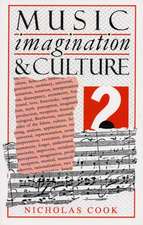Listening to War: Sound, Music, Trauma, and Survival in Wartime Iraq
Autor J. Martin Daughtryen Limba Engleză Paperback – 22 oct 2020
| Toate formatele și edițiile | Preț | Express |
|---|---|---|
| Paperback (1) | 160.35 lei 31-37 zile | +43.31 lei 6-10 zile |
| Oxford University Press – 22 oct 2020 | 160.35 lei 31-37 zile | +43.31 lei 6-10 zile |
| Hardback (1) | 255.45 lei 10-16 zile | |
| Oxford University Press – 8 oct 2015 | 255.45 lei 10-16 zile |
Preț: 160.35 lei
Preț vechi: 182.74 lei
-12% Nou
Puncte Express: 241
Preț estimativ în valută:
30.69€ • 33.32$ • 25.78£
30.69€ • 33.32$ • 25.78£
Carte tipărită la comandă
Livrare economică 12-18 aprilie
Livrare express 18-22 martie pentru 53.30 lei
Preluare comenzi: 021 569.72.76
Specificații
ISBN-13: 9780190887834
ISBN-10: 0190887834
Pagini: 360
Dimensiuni: 231 x 155 x 23 mm
Greutate: 0.54 kg
Editura: Oxford University Press
Colecția OUP USA
Locul publicării:New York, United States
ISBN-10: 0190887834
Pagini: 360
Dimensiuni: 231 x 155 x 23 mm
Greutate: 0.54 kg
Editura: Oxford University Press
Colecția OUP USA
Locul publicării:New York, United States
Recenzii
To say that Listening to War is ground-breaking, penetrating, and vitally important doesn't begin to convey the affective and intellectual impact of engaging with this work. More than challenging music and sound apprehension and scholarship, the book offers painful, visceral access to the ways in which ears suffer, bodies suffer, places suffer in wartime. There is no escape into abstraction or aestheticization here. It's shattering, from the very beginning...
This book is profound and urgently important. It is literally a study of war, not its outcomes. Daughtry expands ethnomusicologists' most basic assumptions, stepping sideways from music to the moment when sound creates and obliterates the self. He parses the inhabited, diachronic moment of sonic violence in a way I wouldn't have thought critically possible. Listening to War is stunningly smart, informed, and original. Virtually every sentence made me pause. Daughtry shows how ethnomusicology can-and should-address the most pressing issues of our time.
Although the sounds of war are often recounted in art and scholarship, Listening to War is the first book I know of that helps us to really understand them. J. Martin Daughtry uses the anthropology of sound and hearing to offer a profound investigation of the experience of being close to violence-both of people physically proximate to violence and people unable to extricate themselves from it, either during wartime or afterward. This is a rare scholarly book: gripping, haunting, troubling and deeply edifying. I could not put it down.
More than any other ethnomusicologist over the last decade, J. Martin Daughtry has challenged and deeply reconfigured my understanding of sound, and that's not trivial considering that I taught a course called "Sound" for many years. In this book he performs an extraordinary trick: he has taken the web of sonic violence that surrounds all in a theatre of war and he has extended the intimate and visceral experience of its power and its horror to his readers. Daughtry has immersed us in the most important work of sound studies in many years.
I have not read a more thorough case study of military conflict and sound, one that is so scrupulously documented, with its own implications and methodologies so fully explored. If, in fact, this study is exhaustive, what is the next step in research? The monograph gestures toward some answers. For example, the discussion of acoustic territories (p. 189 and elsewhere) is a further reminder of the interconnectedness of mind, body, and the physical environment, and fortifies the argument that the study of sonic experience provides the most promising platform for the further development of studies in cognitive theory. Apart from its own awe-inspiring comprehensiveness, the book provides a foundation for continued exploration of such emergent fields as cognitive ecology, extended mind theory, and the relationship between gesture and cognition.
This book is profound and urgently important. It is literally a study of war, not its outcomes. Daughtry expands ethnomusicologists' most basic assumptions, stepping sideways from music to the moment when sound creates and obliterates the self. He parses the inhabited, diachronic moment of sonic violence in a way I wouldn't have thought critically possible. Listening to War is stunningly smart, informed, and original. Virtually every sentence made me pause. Daughtry shows how ethnomusicology can-and should-address the most pressing issues of our time.
Although the sounds of war are often recounted in art and scholarship, Listening to War is the first book I know of that helps us to really understand them. J. Martin Daughtry uses the anthropology of sound and hearing to offer a profound investigation of the experience of being close to violence-both of people physically proximate to violence and people unable to extricate themselves from it, either during wartime or afterward. This is a rare scholarly book: gripping, haunting, troubling and deeply edifying. I could not put it down.
More than any other ethnomusicologist over the last decade, J. Martin Daughtry has challenged and deeply reconfigured my understanding of sound, and that's not trivial considering that I taught a course called "Sound" for many years. In this book he performs an extraordinary trick: he has taken the web of sonic violence that surrounds all in a theatre of war and he has extended the intimate and visceral experience of its power and its horror to his readers. Daughtry has immersed us in the most important work of sound studies in many years.
I have not read a more thorough case study of military conflict and sound, one that is so scrupulously documented, with its own implications and methodologies so fully explored. If, in fact, this study is exhaustive, what is the next step in research? The monograph gestures toward some answers. For example, the discussion of acoustic territories (p. 189 and elsewhere) is a further reminder of the interconnectedness of mind, body, and the physical environment, and fortifies the argument that the study of sonic experience provides the most promising platform for the further development of studies in cognitive theory. Apart from its own awe-inspiring comprehensiveness, the book provides a foundation for continued exploration of such emergent fields as cognitive ecology, extended mind theory, and the relationship between gesture and cognition.
Notă biografică
J. Martin Daughtry is an associate professor of ethnomusicology and sound studies at New York University. His work centers on acoustic violence; voice; listening; sound studies; the Iraq war, and musics of the Russian-speaking world. Daughtry is co-editor, with Jonathan Ritter, of Music in the Post-9/11 World (Routledge 2007), and has published essays in Social Text, Ethnomusicology, Music and Politics, Russian Literature, Poetics Today, and a number of edited collections.














